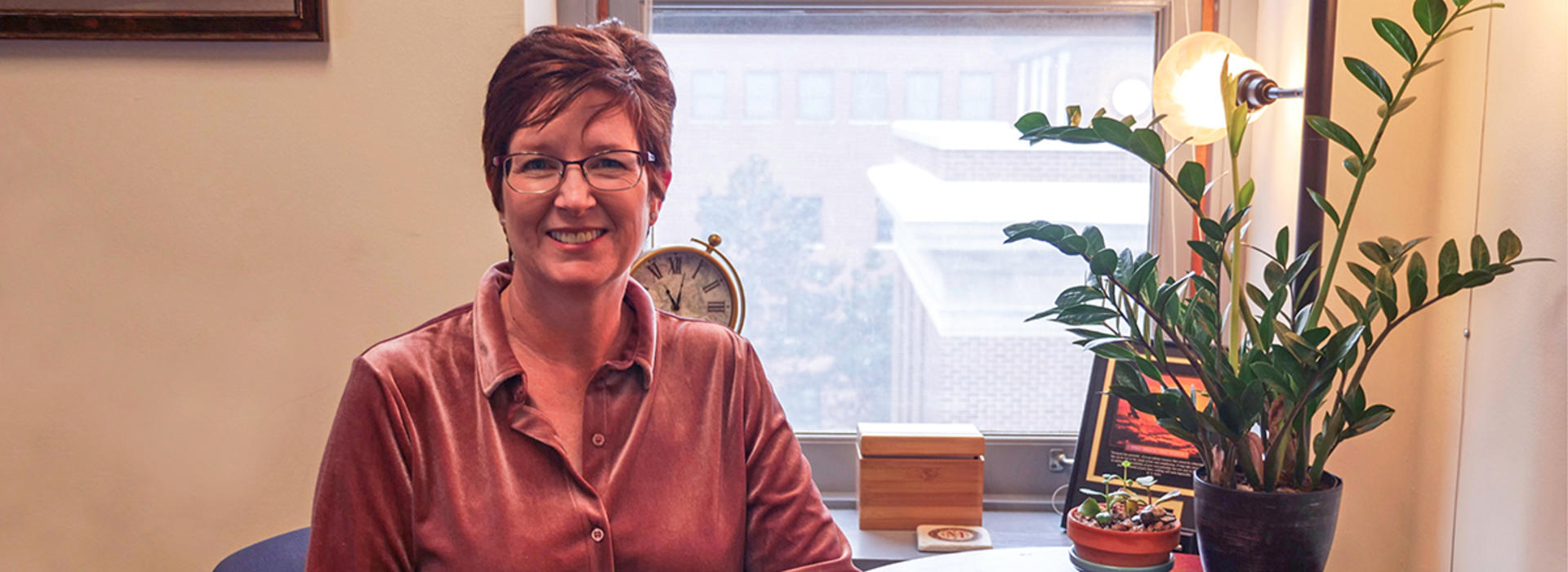
Helping Students Navigate Mental Health Concerns
Taking care of the mental health needs of medical students is an important focus for the University of Minnesota Medical School. From limiting the number of contact hours for first-year and second-year medical students to creating a learning community system for students, several programs have recently been initiated to support the mental health needs of students. Making sure mental healthcare is available and accessible when it is needed is a vital component in caring for students.
Enter, Maryanne Reilly-Spong, PhD, psychologist of Medical Education. In this new role—the first-ever in Medical School history and among the first in programs across the country—she is providing short-term support to students who need help dealing with mental health concerns, helping to alleviate their symptoms and referring them to further resources or care. Dr. Reilly-Spong’s role is not limited to mental health counseling; she also provides performance coaching. Students can plan their medical board study schedules and strategies with her or receive coaching on test-taking or stress reduction.
Scott Slattery, PhD, director of Learner Development at the Medical School, and Dr. Reilly-Spong created Confidential Bridging Services, which opened December 2018, shortly after Dr. Reilly-Spong joined the Office of Learner Development as a postdoctoral fellow in psychology. She was appointed to her new role in late 2019.
This innovative, in-house counseling clinic program addresses the specific issues of availability and accessibility of mental healthcare for students. When seeking counseling to deal with the challenges of Medical School, students often struggle with long waitlists and inflexible office hours of traditional care providers. The services Dr. Reilly-Spong delivers help to bridge that gap, provide support and point students in the right direction for further care.
“Maryanne was such a wonderful and needed addition last year to the Medical School. Success of the Confidential Bridging Services provided by Maryanne has combated stigma and provided timely and needed support to countless students,” Dr. Slattery said. “The success of the program, combined with her compassion and the depth of her experience made hiring her as an ongoing presence an easy decision.”
Responding to a variety of concerns
Dr. Reilly-Spong responds to a variety of concerns from students, including managing stress and anxiety throughout the school year.
“As the school year begins, first-year students often need support adjusting to the workload of medical school and trying to forge connections with their peers,” Dr. Reilly-Spong said. “For many incoming students, this is the first time since grade school that they've started with a totally new peer group where they don't know anyone. Somewhat similarly, for students who are underrepresented in medicine, it's quite stressful to connect and make friends. It's a lot of pressure."
Spring presents several seasonal affective symptoms (sadness, anxiety, sleep problems) that are not helped by short days and cold weather. This is also when second-year students are coping with Step 1 preparation and getting ready to start rotations, while fourth-year students are preparing for interviews and rank lists for Match Day.
Overcoming stigma
Given the stigma that continues to be associated with seeking mental healthcare, the program places particular emphasis on confidentiality. Dr. Reilly-Spong believes that having the service in the Medical School helps remove that stigma. Medical students are invited to address her as “Maryanne,” if they are comfortable doing so, and she welcomes them to come back and check-in to share about positive events in their lives.
“The stigma is real, but having the program associated with the Medical School communicates acceptability—it’s ok to ask for help,” Dr. Reilly-Spong said. “Also, when students have a positive experience with our clinic, they will be more likely to seek mental healthcare when they need it in the future.”
Demand for services and good results
Since the program began, 146 students have received services (62 of these since 2019 orientation), and Dr. Reilly-Spong has attended a total of 272 visits (179 of these since 2019 fall orientation).
Using a quarterly anonymous questionnaire sent to students who have used the service, the program is rated on a five point scale based on the four tenets of Bowlby’s Attachment Theory.
CBC Survey Outcomes (% responding strongly or somewhat agree) [n = 57 responses collected spring/summer 2019, n=92 students had attended > 1 visit; most between 2-3 visits]
|
Availability–services are available when and where needed (i.e., proximal to the medical school); scheduling is easy and services are free |
An appointment was available when I needed it 98% |
|
Attunement–counselor understands the unique challenges of medical training |
The counselor was attentive and understood my concerns 100% |
|
Responsive–active consultation and referral services are provided; the response matches the need |
The counselor provided useful resources and feedback tailored to my needs 98% |
|
Consistency–follow through and reliability of services are essential |
The counselor was consistent in providing quality services 100% |
|
Overall |
I would recommend CBC services to a peer 100% |
The success of the program means growth for the future, including replacing the post-doctoral fellow position, vacated by Dr. Reilly-Spong when she was hired into her new role, to increase the number of students who can be helped. Additional improvements on the horizon include incorporating qualitative feedback to the assessment, providing a comprehensive list of resources and referrals for students and investigating the possibility of using telehealth to serve students across all training sites.